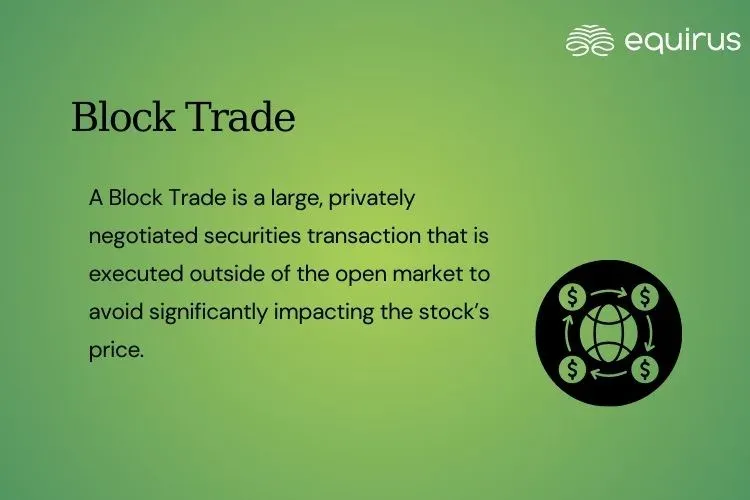Block Trade

Key Highlights
-
A Block Trade is a large, privately negotiated securities transaction that is executed outside of the open market to avoid significantly impacting the stock’s price.
-
In India, block trades are regulated by SEBI and occur through a special trading window on stock exchanges.
What is a Block Trade?
A Block Trade is a large, privately negotiated securities transaction that is executed outside of the open market to avoid significantly impacting the stock’s price.
It typically involves:
- A large number of shares or bonds
- A buyer and a seller (often institutional investors like mutual funds, pension funds, or hedge funds)
- Minimal public visibility during the negotiation
Key Features of a Block Trade
Large Size
- Equity block trades usually involve 10,000 shares or more (excluding penny stocks), or trades with a market value above a certain threshold, often ₹5 crore or more in India.
- In bond markets, block trades can run into hundreds of crores or millions of dollars.
Off-Market Execution
- Trades are typically carried out through investment banks, brokers, or dark pools to prevent price swings.
Speed and Confidentiality
- Block trades are executed quickly and discreetly to prevent market speculation and price volatility.
Why Block Trades Happen?
-
Avoid Market Impact: If a large investor sells in the open market, it could drive the price down sharply.
-
Privacy: Institutions may not want to reveal their trading intentions.
-
Custom Terms: Negotiated trades can include specific prices and conditions not available on public exchanges.
Example
Let’s say a mutual fund wants to sell 1 million shares of Company X. Selling them on a stock exchange might:
- Alert other traders
- Cause a price drop
- Attract arbitrageurs
Instead, they approach an investment bank to find a buyer. The bank negotiates a block deal between the fund and a buyer, often at a slight discount to the market price to compensate for the bulk size
Block Deals in India
In India, block trades are regulated by SEBI and occur through a special trading window on stock exchanges:
-
Timings: Morning window (8:45 – 9:00 AM) and afternoon window (2:05 – 2:20 PM)
-
Minimum order size: ₹5 crore
-
Price range: Must be within ±1% of the previous day’s closing price
Risks and Challenges
1. Price Discount: Sellers may need to offer discounts to attract buyers for large volumes.
2. Information Leakage: Rumors about a block trade may still impact stock prices.
3. Counterparty Risk: Especially in over-the-counter (OTC) block deals.
Block Trade vs Bulk Deal vs Normal Trade
| Feature | Block Trade | Bulk Deal | Normal Trade |
|---|---|---|---|
| Volume | Very high | Moderate to high (≥0.5% of shares) | Any size |
| Visibility | Not visible until reported later | Reported same day to exchange | Real-time market order book |
| Execution | Off-market or special window | On the open market | On the open market |
| Counterparties | Mostly institutional investors | Institutions or large investors | Anyone |
